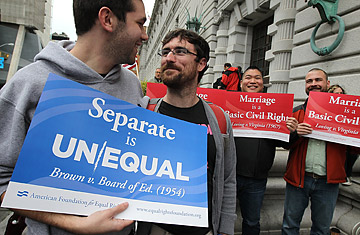
Opponents of Proposition 8 celebrate outside the Ninth Circuit Court of Appeals in San Francisco on Feb. 7, 2012. A three-judge panel of the court ruled that the voter-approved Prop 8 measure violates the civil rights of gay men and lesbians
The ruling Tuesday, Feb. 7, striking down California's ban on gay marriage marks the first time a federal appellate court has squarely rejected a state decision to limit marriage to straight couples. In so doing, it scored big for the two couples who brought the case and the thousands more who hope to marry in California.
However, the decision did less than many gay-rights advocates had hoped: it said nothing about whether the U.S. Constitution guarantees gays and lesbians the right to marry someone of their own sex. And the reinstitution of marriage for gay couples in California may well be put on hold while it is appealed to the Supreme Court, where its fate remains in the hands of Justice Anthony M. Kennedy's swing vote. That is, if the Supreme Court deigns to take it up.
But the explosion of joy via Twitter over the ruling — and the less raucous but just as earnest online hand-wringing by gay-marriage opponents — was not for nothing. By striking down California's Proposition 8, passed on Election Day 2008, the panel ruled 2-1 that California voters violated the U.S. Constitution by singling out gays and lesbians when they wrote a ban on same-sex marriage into the constitution. It mattered not one bit, the two-judge majority wrote, that gays had been given the right to marry mere months before, in a landmark decision by the California Supreme Court.
In his majority opinion, Justice Stephen Reinhardt said it was the fact that Prop 8 took away rights that violated the U.S. Constitution. He channeled the Supreme Court's first decision broadly favoring gay rights: the 1996 opinion Romer v. Evans, which struck down a statewide referendum in Colorado that had barred cities from passing local ordinances aimed at protecting gays from workplace and housing discrimination. He wrote, "Romer ... controls where a privilege or protection is withdrawn without a legitimate reason from a class of disfavored individuals, even if that right may not have been required by the Constitution in the first place."
In doing so, Reinhardt sent a not very subtle message to Justice Kennedy, who is likely to be the decisive Supreme Court vote and who also wrote the Romer opinion. Professor Erwin Chemerinsky, law dean at the University of California at Irvine, says, "I think it's clear that everyone knows that Justice Kennedy is who matters most on the Supreme Court. The panel was trying to rule narrowly and rely on Kennedy opinions. That makes sense — his opinions are the key opinions. I think the court was also being very careful."
The proponents of Prop 8 have 14 days to ask for a rehearing before the full court. If they do, or if they file a notice of appeal, Prop 8 could remain intact in California for months or longer. The opposing legal team would ask that the stay that has been in place since Judge Vaughn Walker issued his California Supreme Court decision in 2010 be lifted. That could be a long shot, given the caution with which courts have always dealt with such requests. If it is granted, however, the soonest Prop 8 could be lifted would be Feb. 28, seven days after the 14-day deadline.
Andy Pugno, general counsel for the ProtectMarriage.com coalition, the official proponents of Proposition 8, says he expected all along to lose at the Ninth Circuit. "Ever since the beginning of this case, we've known that the battle to preserve traditional marriage will ultimately be won or lost not here but rather in the U.S. Supreme Court. We will immediately appeal this misguided decision that disregards the will of more than 7 million Californians who voted to restore marriage as the unique union of only a man and woman. We are confident that the rights of California voters will finally win out."
Nearly everyone believes the issue of gay marriage will eventually be put before the Supreme Court. Nevertheless, Tuesday's decision may make it less likely that the Prop 8 case is the means by which it will arrive. David Boies, who with former U.S. Solicitor General Theodore Olson has led the legal charge in the case, said he had his doubts. "The grounds for the opinion, in my view, do make it somewhat less likely that the Supreme Court will take it," he said in a presser called after the decision was released.
